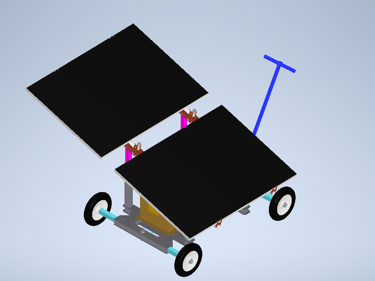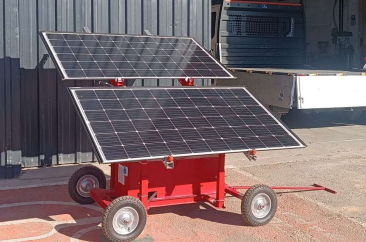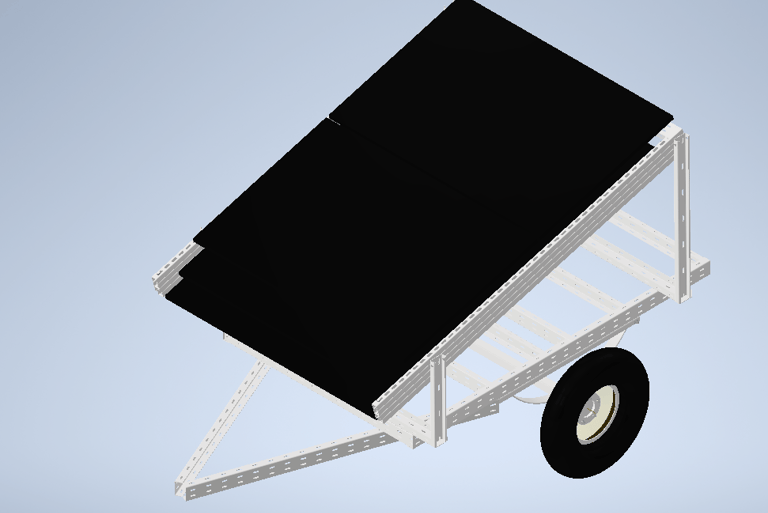Designing Your Own Solar Mobile Trailer: Tips and Insights
11/25/20248 min read


Understanding Solar Mobile Trailers
Solar mobile trailers are innovative solutions designed to harness solar energy for various applications in a portable format. These versatile trailers are typically equipped with solar panels, batteries, and essential equipment to convert sunlight into usable electricity, making them an ideal choice for a range of utility-free programs. Their primary purpose is to provide off-grid power wherever and whenever it is needed, significantly minimizing dependence on traditional energy sources.
One of the defining features of solar mobile trailers is their adaptability. They can be set up quickly and are perfect for a variety of environments, whether it be outdoor events, construction sites, or emergency response scenarios. For instance, in the context of outdoor gatherings, solar mobile trailers can supply power to lighting, audio systems, and other equipment, thus supporting events sustainably. In construction, they can power tools and lighting, enhancing productivity while reducing the carbon footprint associated with diesel generators or other fossil fuel-based power sources.
The benefits of incorporating solar mobile trailers into various sectors extend beyond mere energy provision. They are increasingly recognized for their eco-friendliness, enabling users to adopt renewable energy solutions. Additionally, the convenience of these trailers cannot be overstated; they can be towed easily and set up in a matter of minutes. This portability allows businesses and organizations to respond swiftly to changing energy demands or emergencies, ensuring that they have reliable power sources in critical situations.
The rising popularity of solar mobile trailers underscores a broader trend towards sustainability and renewable energy adoption. As more industries seek to reduce their environmental impact, these trailers represent a forward-thinking approach to energy generation and consumption, reflecting a commitment to innovation and adaptability in meeting energy needs.
The Importance of Solar Energy in Mobile Applications
As communities and individuals increasingly prioritize sustainability, the significance of solar energy in mobile applications has become more pronounced. The growing demand for mobile solar solutions, such as solar trailers, stems from a confluence of factors that highlight the advantages of harnessing solar power in portable setups. The commitment to reducing dependence on fossil fuels is a primary driving force. Solar energy offers a cleaner alternative that aligns with the environmental goals of both individuals and organizations.
Another contributing factor is the surge in environmental awareness. Climate change and its detrimental effects have prompted people to seek sustainable options for energy generation. Mobile solar trailers represent a practical solution to this growing concern, providing clean energy for various applications while minimizing the ecological impact. Harnessing the sun's power helps reduce greenhouse gas emissions, directly contributing to a smaller carbon footprint. This trend is particularly evident in outdoor events, construction sites, and disaster relief efforts, where conventional power sources may not be feasible or available.
Energy independence is also a pivotal consideration in the adoption of solar mobile applications. Remote locations often suffer from unreliable or nonexistent grid access, making solar energy a reliable choice. Solar mobile trailers enable users to generate power on-site, ensuring consistent energy availability for essential functions. This capability is vital for industries that operate in rural or isolated areas, allowing them to maintain productivity while supporting sustainability initiatives.
Moreover, the versatility of solar energy systems allows users to customize their setups according to specific needs and scales. As technology advances, the efficiency and affordability of solar panels continue to improve, making them an attractive option for a wide range of applications. The integration of solar energy within mobile frameworks not only enhances energy resilience but also fosters a more sustainable future.
Initial Considerations for Your Solar Trailer Design
When embarking on the journey to design your own solar mobile trailer, several initial considerations must be addressed to ensure a successful build tailored to your specific needs. First and foremost, determining the intended use of the trailer is crucial. Whether you plan to utilize it for camping, off-grid living, or mobile business purposes will significantly influence its design and functionality. Understanding these requirements early on will inform decisions regarding size, layout, and necessary components.
Another essential factor to consider is space and weight limitations. Solar trailers are often restricted by certain parameters, such as the towing capacity of your vehicle and the physical dimensions allowed by transport regulations. Therefore, carefully measuring and calculating available space will ensure that you can safely and efficiently transport the trailer while accommodating essential features like living quarters, equipment, or storage facilities.
Regulatory requirements also play a critical role in the design process. Different regions have specific laws governing the construction and operation of mobile trailers, including zoning laws and vehicle registration requirements. It is imperative to research and adhere to these regulations to avoid potential legal issues or investment drawbacks.
Budget constraints are inherently tied to every aspect of your solar trailer design. Establishing a budget early in the planning phase will help to set realistic expectations and prioritize expenditures on crucial components such as solar panels, batteries, and inverters. Selecting high-quality equipment may incur higher initial costs but can lead to greater long-term savings and efficiency gains.
In summary, taking the time to address these initial considerations will lay a solid foundation for your solar trailer project. By defining the intended use, evaluating spatial and weight constraints, adhering to regulatory standards, and managing your budget effectively, you can create a trailer that meets your needs while incorporating essential solar technology.
Choosing Solar Panels and Key Components
When designing a solar mobile trailer, selecting the right solar panels is paramount to ensure maximum efficiency and durability. The market offers a variety of solar panels, primarily categorized into monocrystalline, polycrystalline, and thin-film types. Monocrystalline panels are known for their high efficiency, commonly reaching above 20%, making them suitable for trailers with limited roof space. Meanwhile, polycrystalline panels provide a more cost-effective solution with slightly lower efficiency, typically around 15-18%. Lastly, thin-film panels are lighter and more flexible but require more space due to their lower efficiency.
In addition to the panels, it’s crucial to consider essential components, such as charge controllers, batteries, and inverters, to optimize the solar power system within the trailer. Charge controllers play a vital role in regulating the voltage and current from the solar panels, protecting the batteries from overcharging or excessive discharging. There are two main types: PWM (Pulse Width Modulation) and MPPT (Maximum Power Point Tracking), with MPPT controllers being recommended for enhanced efficiency in larger systems.
When it comes to battery selection, lithium-ion batteries outperform traditional lead-acid options in terms of longevity, weight, and efficiency. Although they come at a higher initial cost, their longer lifespan and lower maintenance requirements can be more economical in the long run. However, lead-acid batteries remain a viable option for those on a budget, with the caveat of requiring more regular maintenance and having a shorter lifecycle.
The integration of inverters is also crucial, as they convert DC electricity generated by the solar panels into AC electricity, suitable for most household appliances. Inverters are available in different forms, including pure sine wave and modified sine wave, with pure sine wave inverters being the most versatile and recommended for sensitive electronics.
Designing for Mobility and Durability
Creating a solar mobile trailer requires meticulous attention to mobility and durability, essential aspects that ensure the structure performs effectively in various environments. The foundation of any trailer is its frame, so selecting the right trailer frame is crucial. Materials such as aluminum or high-strength steel are favorable due to their lightweight and robust properties. A lighter frame translates to easier towing and maneuverability, making the trailer not only more efficient but also adaptable to different terrains.
Moreover, optimizing design for transportability involves more than just the frame; it encompasses the arrangement of solar panels, battery storage, and equipment placement. A well-thought-out layout helps maintain a low center of gravity, which is vital for stability during transit. Quick-release mounts for solar panels can also enhance portability, allowing for rapid assembly and disassembly. This feature becomes particularly useful in varying operational scenarios that might necessitate relocation.
Weatherproofing and protective features are equally important in ensuring the longevity of your solar trailer. Utilizing materials that resist rust and corrosion, such as galvanized steel or specialized coatings, can significantly extend the lifespan of the trailer. Additionally, incorporating watertight seals and UV-protective finishes safeguards the solar panels and electronic components against environmental wear and tear. Features like reinforced corners and impact-resistant coverings will help the trailer withstand rough handling and unpredictable weather conditions.
Ultimately, designing a solar mobile trailer involves a careful balance between functionality and durability. By focusing on the right materials, strategic weight distribution, and robust weatherproofing, you can create a mobile solar unit that not only meets transport needs but also stands the test of time against environmental challenges. Such considerations are pivotal in maximizing the operational efficiency and reliability of the solar mobile trailer.
Incorporating Additional Features and Technologies
When designing a solar mobile trailer, integrating additional features and technologies can significantly enhance both its functionality and user experience. These enhancements can transform a basic solar trailer into a versatile and efficient living or working space. One of the primary considerations when looking to augment your trailer design is the incorporation of lighting systems. Opting for energy-efficient LED lighting not only conserves energy but also provides adequate illumination for both interior and exterior spaces. By employing motion sensors, users can further optimize energy use, ensuring lights are only activated when necessary.
Another essential feature to consider is the installation of electrical outlets to accommodate various devices and appliances. By strategically placing these outlets throughout the trailer, users can easily connect essential equipment, ensuring the efficiency of their energy management. Moreover, integrating USB charging ports offers added convenience for powering smaller devices, enabling a seamless experience for users on the go.
Addressing climate control within the trailer is crucial as well. Depending on the intended use and location, integrating heating or cooling options can significantly improve comfort levels. Portable solar-powered air conditioning units or efficient heating systems can be installed to ensure a pleasant environment, allowing for extended trips in various weather conditions.
Lastly, incorporating smart technology into the trailer design elevates the overall energy management system. Smart meters and energy monitoring systems enable users to track energy consumption in real time. This data can help optimize energy usage patterns, ensuring that the solar power generated is utilized effectively. Such features offer a blend of convenience and sustainability, making the solar mobile trailer not just a mode of transport, but a sophisticated energy-efficient home or workspace.
Testing and Maintenance for Optimal Performance
Regular testing and maintenance of your solar mobile trailer are crucial for ensuring its optimal performance over time. One of the best practices is to conduct routine inspections to assess the condition of the solar panels, battery systems, and electrical connections. It is advisable to check the panels for dirt, debris, or obstructions, as these can significantly reduce energy absorption and efficiency. Cleaning the solar panels with water and a non-abrasive cloth can help maintain their effectiveness.
Battery maintenance is equally important. Lithium-ion batteries, which are commonly used in solar applications, require periodic checks on their charge levels and connections. It is essential to prevent them from overcharging or overly depleting, as this can significantly shorten their lifespan. Additionally, maintaining an optimal temperature range for the batteries can enhance their performance, especially in extreme weather conditions.
Common issues with solar mobile trailers can often be diagnosed through careful monitoring of the energy system's performance. If you notice a decrease in power output, it might be a sign of a malfunctioning component or an energy demand that exceeds the system’s capacity. Employing a monitoring system can provide real-time data on energy usage and battery health, facilitating early detection of potential problems.
When your solar mobile trailer is not in use, proper storage is vital for preserving its components. Ensure that the trailer is parked in a shaded area to protect the solar panels from prolonged sun exposure, which can degrade their materials over time. Additionally, store the batteries in a cool, dry place to prevent deterioration. Lastly, preparing your trailer for various weather conditions, such as securing loose parts before heavy storms, will enhance its resilience and longevity.




